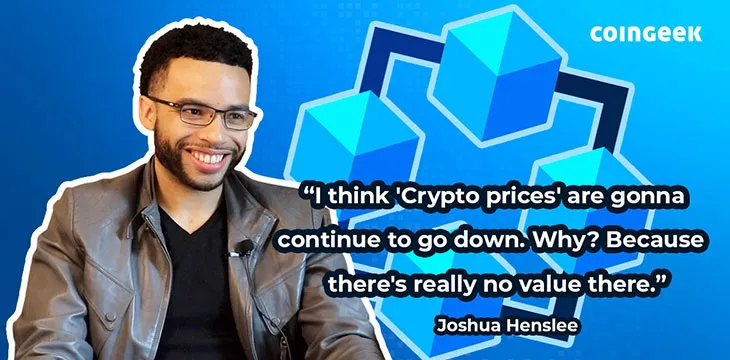|
Getting your Trinity Audio player ready...
|
Bitcoin influencer and thought leader Joshua Henslee recently gave his price predictions for the second half of 2022. As you’ll see, Henslee is still very much a bear and believes that BTC, ETH, BSV, and other digital currencies are headed much lower.
Henslee is first in with the H2 2022 price predictions
Henslee wanted to give predictions at the start of July, so it’s out there as one of the first for the second half of the year. It’s well known that he doesn’t delete videos, and he says that if he’s wrong, this one will remain up, too.
He reiterates his position as a digital currency bear. He says we won’t be seeing any rocket emojis anytime soon. In his view, once $18,000 per BTC breaks, $3,000 is inevitable. Once again, he reminds us that BTC is literally useless and that the current economic circumstances have laid waste to claims that it’s a hedge against inflation or digital gold.
As for other digital currencies, Henslee believes that BSV could end up at $5, BCH at $10, and ETH at between $50 to $100. He thinks we’ll see a mass exodus of users from the industry when this happens since the only reason people are involved is that the price of tokens were going up.
“None of it works,” he reminds us.
How could Henslee be wrong?
Henslee is open to being wrong about this, and he outlines a scenario in which he could be wrong this time.
He begins by painting a picture of the current situation: interest rates are pounding everything and drying up liquidity in many markets. As a result, digital currency markets have nuked downwards, and we’re in the midst of a deep bear market. However, Henslee says that interest rates can’t go above the so-called inflation rate because central banks bought many bonds, including junk bonds. In his opinion, there won’t be many buyers when it comes time to sell them. If government bonds offer good rates, corporate and junk bonds will pay super high rates. This will mean reduced demand for government bonds, which central banks can’t allow. The only solution is to ensure that corporate bonds don’t pay excessively high rates, which means keeping baseline interest rates relatively low.
Henslee also sees a situation whereby central banks could reserve course on interest rates. He points to 2020 when they crashed the markets and immediately reversed course, lowering interest rates again and causing markets to pump across the board. He says he will be wrong if they reverse rates and liquidity makes it into digital currencies. However, even in this scenario, he believes that most of the liquidity will make its way into equities, commodities, etc., which have real use cases and utility.
Some hard predictions for the immediate term
Henslee rounds off by giving some specific predictions for the rest of this year.
He predicts that as mid-term elections in the United States near, the Federal Reserve will loosen monetary policy and pump the stock market. This way, the government can claim it fought inflation and markets made a full recovery. In Henslee’s view, it’s possible some digital currencies with utility will see a pump in this scenario, but he’s not certain. He’s much more sure of a bull market in commodities and equities.
As for inflation, he’s certain we haven’t seen anything yet. He foresees higher food and fuel prices, meaning there will be less space for speculation on digital currencies, deepening his thesis for a prolonged bear market.
Watch: The BSV Global Blockchain Convention panel, Blockchain for Digital Transformation of Nations
https://youtu.be/ggbZ8YedpBE?t=33390

 09-04-2025
09-04-2025 





